When I lived in Japan, I accumulated quite a tower of secondhand yuri manga. I wanted to improve my reading speed for the JLPT, and I felt determined to do it in a way that was enjoyable (read: sapphic) and friendly to both the environment and my bank account.
Suffice it to say, I got very familiar with the yuri sections of my local used bookstores. Whenever I visited, I imagined all the queer women in Nagoya passing the same few volumes of manga around to each other. It was like an unspoken lending library happening on the hilariously tiny gay shelf of every Book-Off in town. Every book had a history before me and a future after me, hopefully having a positive influence on everyone it touched.
But no matter what genre floats your boat, I want that feeling of community reuse for you too. So how do you get started buying secondhand Japanese books? Luckily, it's not too tough. In this article, I'll offer my recommendations on where to buy secondhand Japanese books and manga, both in Japan and overseas. But first, I'll wax lyrical about the wonders of secondhand book buying and teach you some helpful Japanese words for the process. I hope that after reading, you feel more comfortable throwing down some yen at your local secondhand bookstore!
- Why Buy Secondhand Japanese Books & Manga?
- Japanese Words to Look For
- Where to Find Secondhand Books & Manga from Japan
- Read 'Em and Weep
Why Buy Secondhand Japanese Books & Manga?
Of course, there are tons of good reasons to buy Japanese books and manga. Maybe you want to level up your Japanese reading comprehension with some extensive reading, or 多読 (tadoku). Or perhaps you're just an otaku looking for some manga translated into your native language. But why go out of your way to buy them secondhand?
Used manga is notoriously inexpensive in Japan — we're talking less than 100 yen per volume sometimes.
The answer is pretty simple: cheapness, baby. Used manga is notoriously inexpensive in Japan — we're talking less than 100 yen per volume sometimes. And used books are not that far behind, with some great finds priced at less than 1,000 yen. Plus, it's often impossible to tell the difference between a new book and a secondhand one in Japan. Personally, I never noticed any flaws significant enough to hinder my reading experience among the used books I bought there.
On top of that, you're doing the environment a favor by reusing a pre-owned item, so you'll get some self-congratulatory feelings out of the deal. It also feels great to pass on a story or collection of thoughts that affected you to someone else in your community through secondhand resale, or 買い取り (kaitori). Before I left Japan, I resold all but one of my sixty-six volumes of LGBTQ+ manga, partially because I thought they'd do more good being read by someone else than on my shelf collecting dust. (And partially because I was out of luggage space.)
If you want to support your favorite authors or mangaka1 by buying their work full-price, I totally understand. I like to do that too! But otherwise, consider this a friendly invitation to at least check whether the books you want are available secondhand. And you know what would be a great way to start looking?
Japanese Words to Look For
…That's right, learning some vocabulary! If you're only looking for translated books, you probably won't need much Japanese. But if you're in Japan, buying books written in Japanese, or using Japanese sites, you'll need to be hip to some common terms. First, here are a few general words for buying anything secondhand in Japanese.
| 中古 (chūko) | secondhand |
| 通販 (tsūhan) | online shopping, mail order |
| リサイクルショップ (risaikuru shoppu, "recycle shop") | store that sells used goods |
| フリーマーケット (furī māketto) フリマ (furima) |
flea market |
| フリマアプリ (furima apuri) | flea market/e-commerce app |
| 買取, 買い取り (kaitori) | trade-in, buyback |
| 定価 (teika) | regular retail price (new) |
| 参考上代 (sankō jōdai) | manufacturer's suggested retail price, MSRP (new) |
| もったいない or 勿体ない (mottainai) | wasteful, a waste (sometimes used to describe goods that would go to waste if not put up for sale) |
Got those phrases down? Well done, my fellow cheapskate. Now, here are some more specific words for all your secondhand (and regular) book-buying needs.
| 中古漫画 (chūko manga) 中古コミック (chūko komikku) |
secondhand manga/comic(s) |
| 中古本 (chūkobon) 古本 (furuhon) |
secondhand book(s) |
| 古本屋 (furuhon'ya), 古書店 (koshoten) | used bookstore |
| 単行本 (tankōbon) | single volume/standalone book |
| X巻セット (X maku setto) | X-volume set (e.g. 8-volume set) |
And that's it! Pretty easy compared to buying secondhand clothes. Next up — where do you find those musty old tomes anyway?
Where to Find Secondhand Books & Manga from Japan
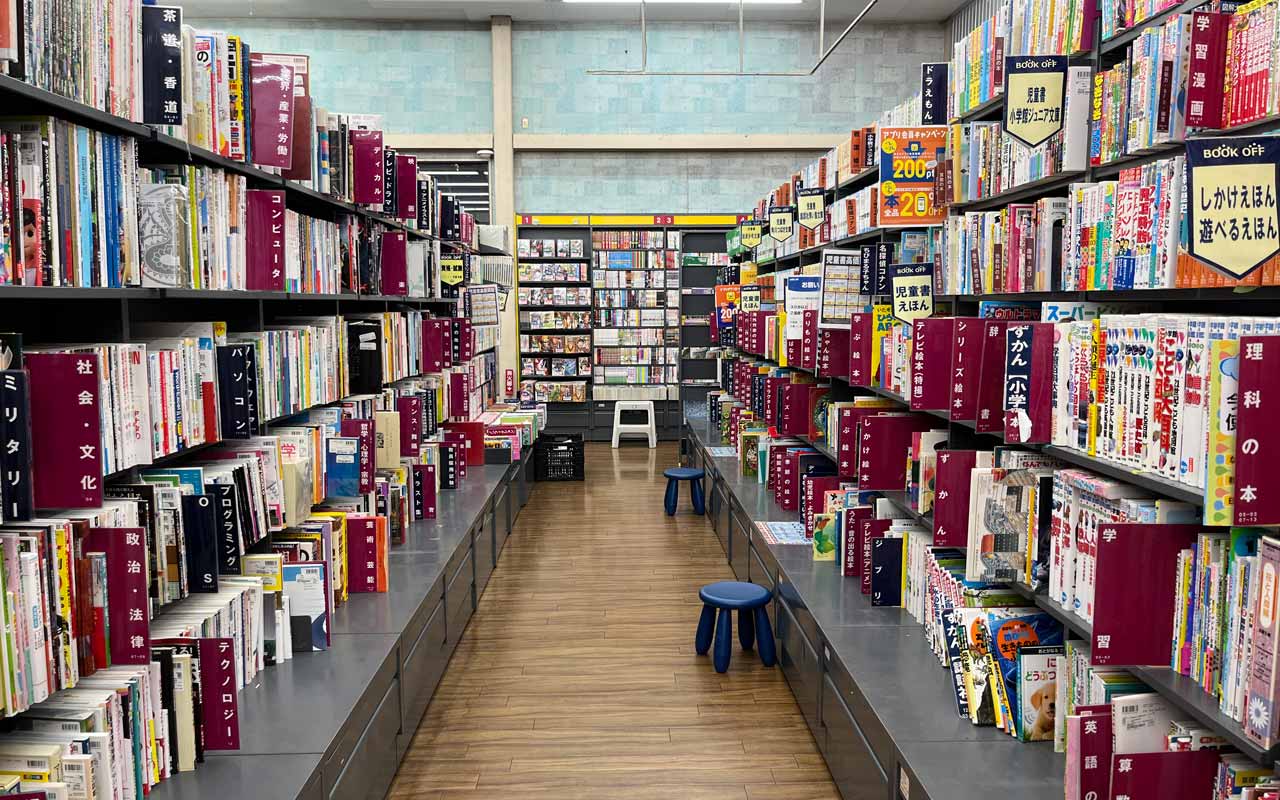
Fortunately, Japan has no shortage of secondhand booksellers, from global chains to local shops to online marketplaces. So where should you start? Well, it depends on where you live and what kind of book or manga you're looking for.
Do you want secondhand books written in Japanese? Then your options are:
- buy Japanese books that are already in your country,
- import books from merchants that ship internationally or through a third-party forwarding service, or
- live in Japan.
If you don't live in Japan, you may be in for a rough time.
If you don't live in Japan, you may be in for a rough time. Option #2 can be wallet-bustingly expensive, so I highly recommend going with #1 whenever possible. Seriously, it's the import fees that'll getcha! But if you must import, try ordering things in bulk to save on international shipping. Or you can always buy e-books in Japanese, eliminating shipping costs entirely. (Can you tell this is my preferred strategy after leaving Japan?)
On the other hand, are you looking for secondhand books that are translated into English or another language? Good news — that tends to be easier, assuming you don't live in Japan. All you need to do is buy from sellers within your country or Japanese retailers with an international presence.
First, I'll introduce stores that have both Japanese locations/websites and international websites with overseas shipping. These are great places to look for both translated and untranslated books/manga. Then, I'll get into some Japan-only merchants that sell primarily untranslated works. Reference whichever sections are most useful to you, depending on where you hang your hat. Darn you, size of the world!
Stores with Both Japanese and International Websites
Outside of Japan, it can be pretty easy to find new, translated manga. Even untranslated books and manga aren't hard to track down if you're lucky enough to live near a Kinokuniya or Book-Off. However, buying Japanese books/manga that are both secondhand and untranslated is by far the toughest permutation if you live overseas.
It's not impossible, though! You'll just have to boot up the good old internet, which is why I've focused on online stores here. For research purposes, I went as far as the shipping screen at each merchant to compare international shipping costs. (Look forward to the juicy exposé in the following sections.) I put them in order from the ones I'm most familiar with to least familiar with, but they're all worth perusing.
Rest assured, all of these stores offer ways to buy from within Japan and internationally. So no matter where you live, check out these accessible retailers for all your secondhand book/manga needs!
Suruga-ya (駿河屋)
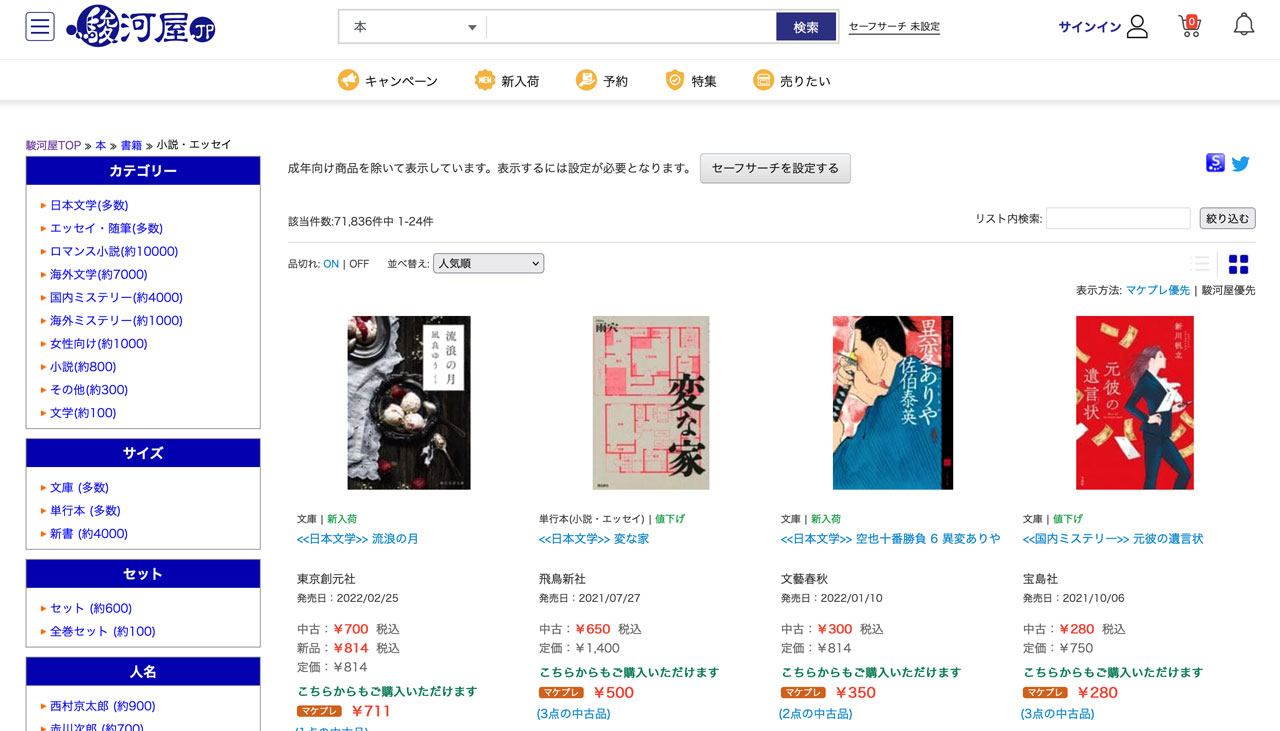
If there's a one-stop shop for secondhand Japanese books and manga, in my opinion, it's Suruga-ya. Most of my leaning tower of secondhand manga in Japan came from me and my wallet letting loose on their online store. Like a lot of secondhand books/manga in Japan, one volume is often only 100-200 yen. Suruga-ya also has the cheapest shipping prices I've seen within Japan: less than 500 yen for orders under 1500 yen, and free for orders 1500 yen or more. This low threshold for free shipping makes it dangerously easy to just keep crawling back for more.
I'd really only recommend Suruga-ya if you can get domestic shipping within Japan.
The shipping fees on their international site are quite a bit steeper though. My pretend purchase of one 160 yen book would've cost me over 2,000 yen to ship, and four books would've run me about 4500 yen in shipping fees. Additionally, you only get shipping discounts if you spend 10,000 yen or more, and they're pretty measly (500 yen off for spending 10,000 yen; 1,000 yen off for spending 20,000 yen). Thus, I'd really only recommend Suruga-ya if you can get domestic shipping within Japan or are desperate for certain untranslated titles and willing to shell out for international shipping.
But uniquely, Suruga-ya also sells secondhand games, merchandise, toys, CDs, DVDs, electronics, and more that also tend to be pretty cheap. So if you want to throw any of that into your cart while you're at it, Suruga-ya might be handy for you! It's certainly my top choice for secondhand manga.
Mercari (メルカリ)
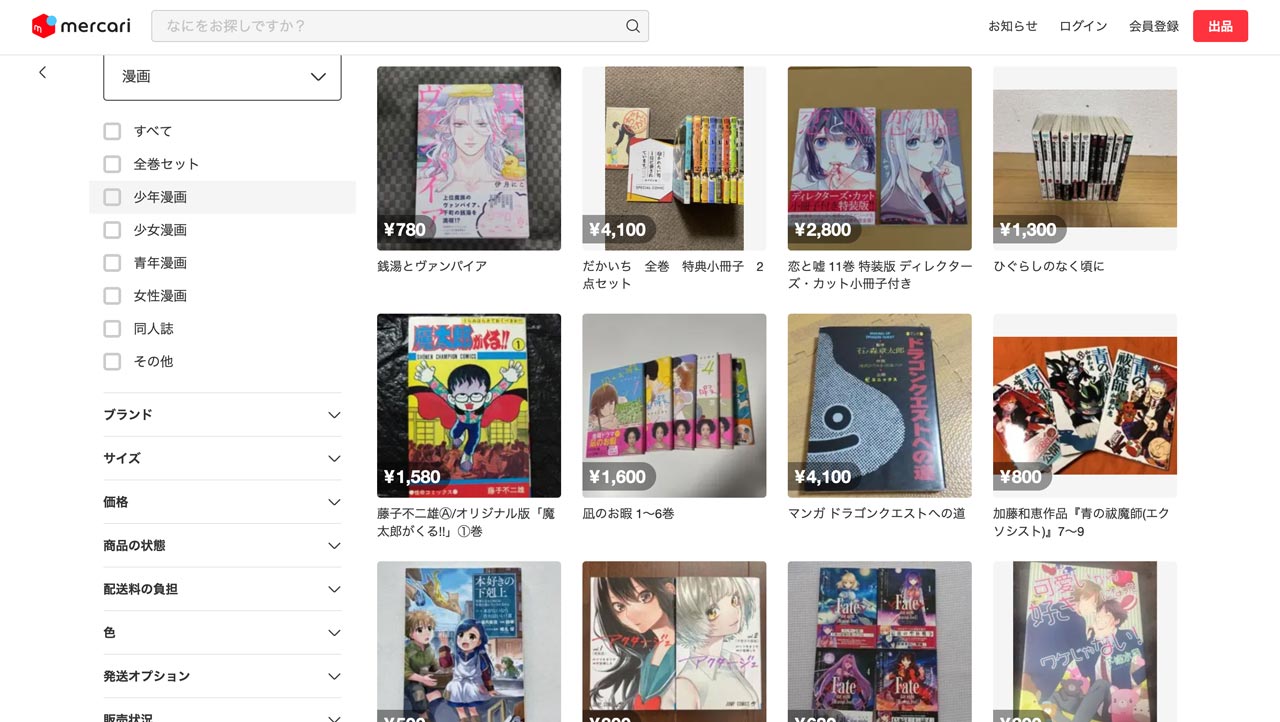
Speaking of my greatest loves in this cruel universe, yes, I am once again shilling for Mercari. For the uninitiated, Mercari is a Japanese e-commerce app/website where ordinary people buy and sell their used goods. If you've never heard of it before, check out our general article on secondhand shopping for more detailed advice on using the platform effectively.
If you're not picky about what you read in Japanese, this might be an interesting way to roll the dice on your reading material.
When it comes to specifically finding secondhand books and manga on Mercari, your luck will vary. On the international English version of Mercari, most translated titles I search for are available, thanks to some Joe Schmo out there looking to get rid of it. Similarly, on the Japanese version of Mercari (メルカリ), almost any untranslated title I've searched for is available for purchase from some Joe Schmorimoto out there. Makes sense, since the languages match the versions of the app.
As usual, though, the trouble starts when the language doesn't match the version of the app; that is, when you're looking to buy untranslated works overseas or translated works in Japan. There is a surprising variety of books and manga in Japanese on English Mercari — just search 漫画 (manga), 本 (hon, "book"), or any other relevant Japanese word and whatever's available at the time will come up. You may not be able to find exactly what you're looking for, but if you're not picky about what you read in Japanese, this might be an interesting way to roll the dice on your reading material. By the same token, there are English versions of Japanese books/manga on Japanese Mercari sometimes.
In both of these cases, the "saved search" function of Mercari might help you keep an eye out for when that specific book you want becomes available. In their bios, some sellers even offer to take requests to buy certain titles you're looking for, although it might cost you a little extra.
Assuming you can find something you want, it'll probably be fairly cheap on either version of Mercari.
Assuming you can find something you want, it'll probably be fairly cheap on either version of Mercari. The biggest advantage is that you're likely shopping for items that are already in your region of the world, meaning no need to go bankrupt on import fees. This method can save you some massive yen, so I especially recommend checking out Mercari if you live outside of Japan and are looking for translated titles or have an "anything goes" attitude about which Japanese book/manga you buy. Plus, you're helping people rehome their old stuff to avoid a dreaded mottainai situation.
Book-Off (ブックオフ)

If you've done any secondhand shopping in Japan, you've probably heard of the "-Off" series of stores. Japan's most well-known chain retailer of used books, Book-Off, falls under this umbrella company as well. With over 800 locations in Japan, you can't go more than a few blocks in any Japanese metropolis without stumbling across one. The bold colors and giant 本 signs make them pretty unmissable!
Not only is Book-Off great for buying used books, it's great for unburdening yourself of them too.
If you're in Japan, you have the pleasure of checking out a Book-Off in person. When I lived in Nagoya, one of my favorite activities was to wander into one and just see what I could stumble upon. A huge portion of their manga is in the 100 yen "corner" (which is apparently what Book-Off likes to call massive wall-to-wall shelves). There's always a wide selection of books and manga available at Book-Off, so even if you can't find what you're looking for, you're sure to come out with something interesting.
Not only is Book-Off great for buying used books, it's great for unburdening yourself of them too. Remember my mountain of gay manga, mostly from Suruga-ya? I resold all but one volume to Book-Off. They tend to pay you about half the retail price, and I was impressed that they actually paid up for almost all of the generally uncommon, off-the-heterosexual-path manga I brought them. Any used bookstore that offers buyback (買い取り) will probably be okay, but consider this my testimonial for Book-Off.
They're one of the few retailers that sell untranslated Japanese manga in the US.
Unfortunately, if you're in the West, Book-Off might not have quite the same luster as it does in Asia. Their US website mainly sells older series of manga (not books), with free shipping only kicking in if you spend $150 or more. However, they're one of the few retailers that sell untranslated Japanese manga in the US. Plus, the regular shipping costs are pretty reasonable, since their stock has already been imported. My pretend order of nine volumes of manga would have cost $8 to ship to the West coast — not bad at all! So if you're a retro manga lover who wants to read in Japanese, American Book-Off might be a good option for you.
Amazon
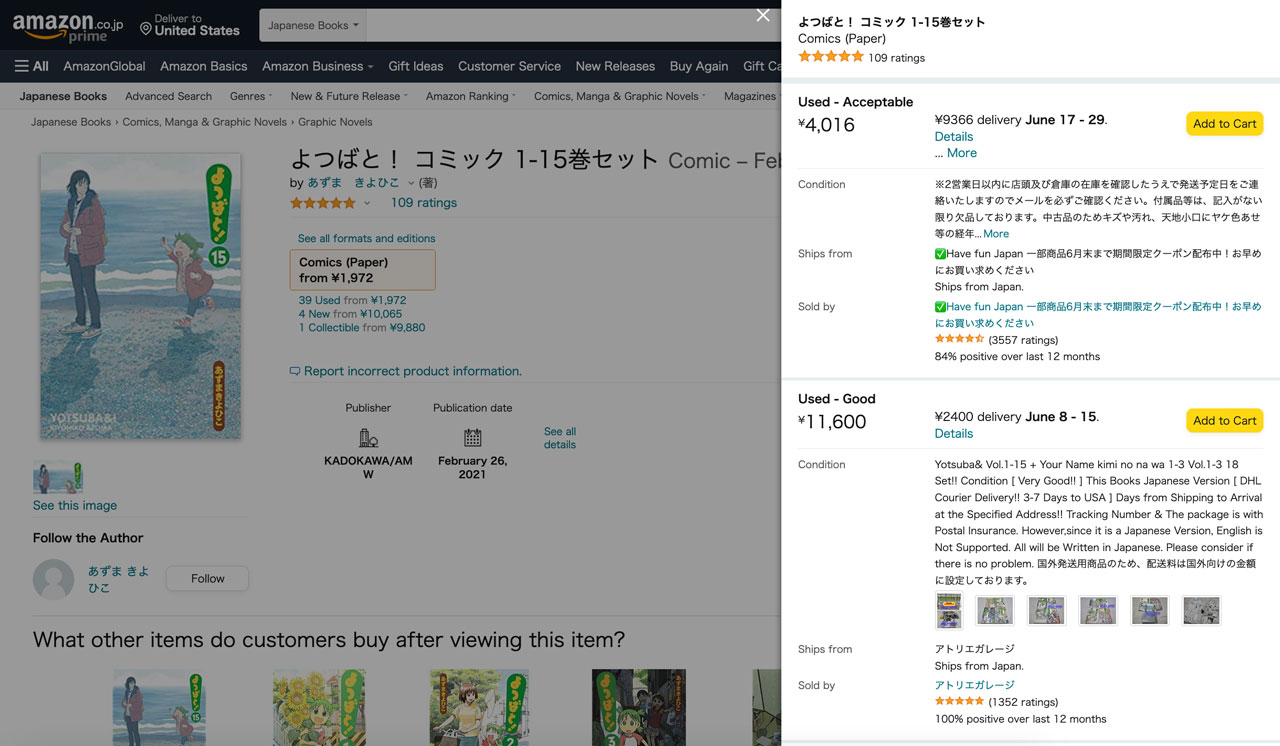
Ah, Amazon. If you must utilize our internet shopping overlord, you have two options: Amazon Japan or your own regional version of Amazon. You can make an Amazon Japan account (separate from your regular Amazon account) and buy from overseas, as some sellers do ship internationally. And don't worry, you can use international credit/debit cards, unlike on some Japanese online stores.
Books/manga in particular can be fairly cheap to import on Amazon Japan, especially if you're buying a full series set.
Books/manga in particular can be fairly cheap to import on Amazon Japan, especially if you're buying a full series set. On the other hand, when you're buying things from separate sellers, shipping can add up quickly. And if you're only buying one volume of manga at a time, the cost may not be worth it. In any case, it can be hit or miss, so definitely plug your address into the checkout to see how much the damage is for optimal wallet health.
You can sometimes find untranslated books and manga on non-Japanese Amazon too.
Interestingly, you can sometimes find untranslated books and manga on non-Japanese Amazon too. They're labeled as "Japanese Edition," so they're easy to differentiate from translated editions. On both Amazon.co.jp and Amazon.com, don't forget to look for "Used" options and check them out — if there are any secondhand options, you'll find them right below the regular non-used purchase option. Amazon sellers list the condition of the used books as well, so you can decide how pristine or raggedy you want your new tome to be. Especially on Amazon.co.jp, "Very Good" tends to be basically mint condition, and "Good" is usually great too, so you're pretty safe to trust the evaluation system here.
Costs for untranslated books/manga can be a bit higher on Amazon than Mercari, even for used volumes. But on the other hand, Amazon does tend to have a wider selection than international Mercari. So if what you're looking for is only available on Amazon, you don't want to add it to a bulk order elsewhere, and/or you want reliably fast shipping, Uncle Jeff's money emporium might be the only way to go.
Stores Only in Japan
Yeah yeah, international shipping will rob you blind…but what if you actually live in Japan? You lucky duck! When it comes to finding untranslated secondhand books and manga, the world is your カキ2. You can pick from any of the retailers I already talked about — in fact, since you're buying from within Japan, you'll have access to better prices and a wider variety there than people using their international sites. Or you can revel in sweet, sweet exclusivity and explore the following stores that are currently only available in Japan.
Take this section with a grain of salt, since I haven't personally bought from most of these stores. I did extensively comb through their Japanese websites so you don't have to, though, so let's get crackin'!
Local Used Bookstores
Do you have morals? Would you rather your hard-earned yen go to a mom and/or pop than the human equivalent of the Monopoly Man? Then consider investigating whether there are any local used bookstores in your area. If you're looking for something ultra specific, buying online might be the more logical choice — but for a random browse on a sleepy Sunday afternoon? There's nowhere better.
To start exploring, type the word 古本屋 (furuhon'ya) or 古書店 (koshoten), both of which mean "old/secondhand bookstore," into Google Maps. Google-sensei will then show you used bookstores close to you, including both independent shops and big chains. On your next trip outside, try going to one and seeing what you can find! You'll support your local community, and perhaps even engage in the ancient art of tachiyomi3 (立ち読み) while you're at it. Just remember to maybe buy something too, if you're gonna stand there breathing their air all day.
Net Off (ネットオフ)
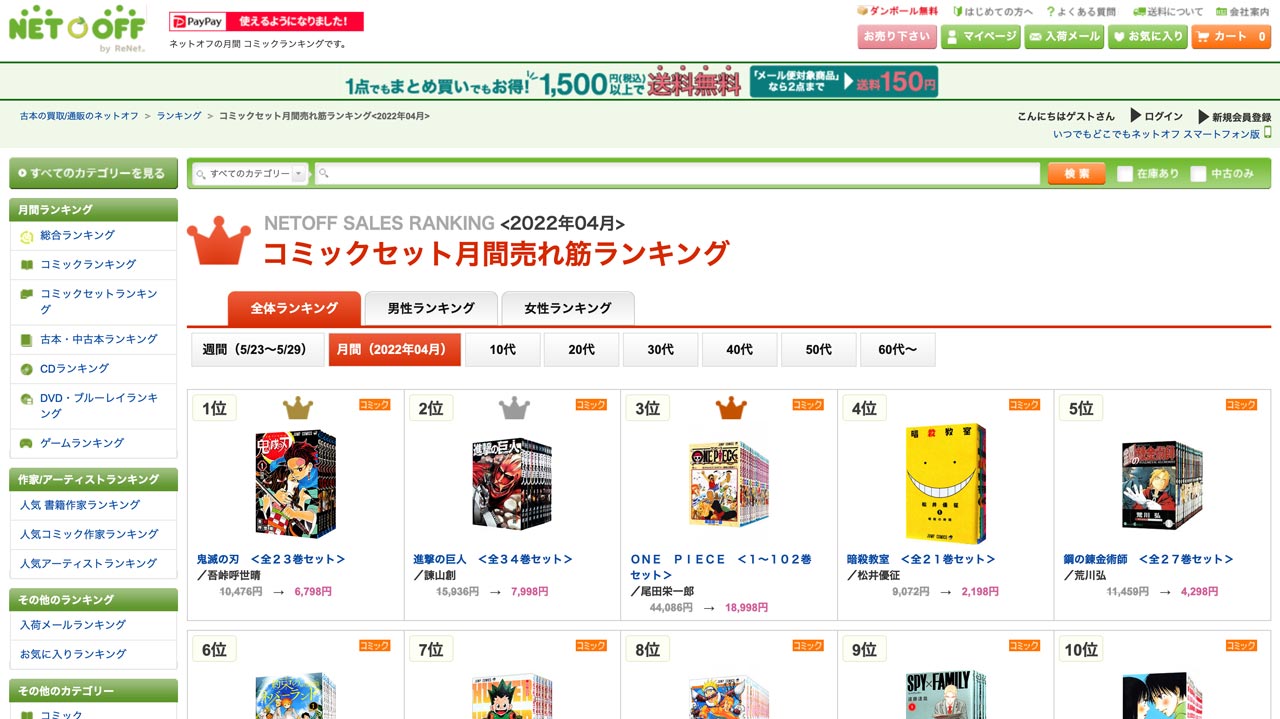
Alright, you've bought some goodies from your local used bookstores. But what if you're on the hunt for something they don't have?
If I still lived in Japan, Net Off would be a go-to option for me.
If I still lived in Japan, Net Off would be a go-to option for me, right next to Suruga-ya and Book-Off. Net Off's manga prices are about the same as those two, and their shipping prices are not that far off. Currently, shipping within Japan is 440 yen for orders under 3,000 yen and free over 3,000 yen, with sales that cheapen it even further. This is another great place to place bulk orders, especially when there's a holiday special going on.
Like Suruga-ya, they sell games, CDs, and DVDs too, so you can toss a 348 yen copy of Animal Crossing: Wild World into your cart full of Demon Slayer doujinshi4. To only see secondhand stuff, just search for something, look under さらに絞り込んで探す ("filter your search further"), find コンディション ("condition"), and click the checkbox next to 中古のみ ("secondhand only"). Net Off will also buy your used stuff, but only through the mail. It does appear to be free though, so no reason not to give it a try!
Tsutaya
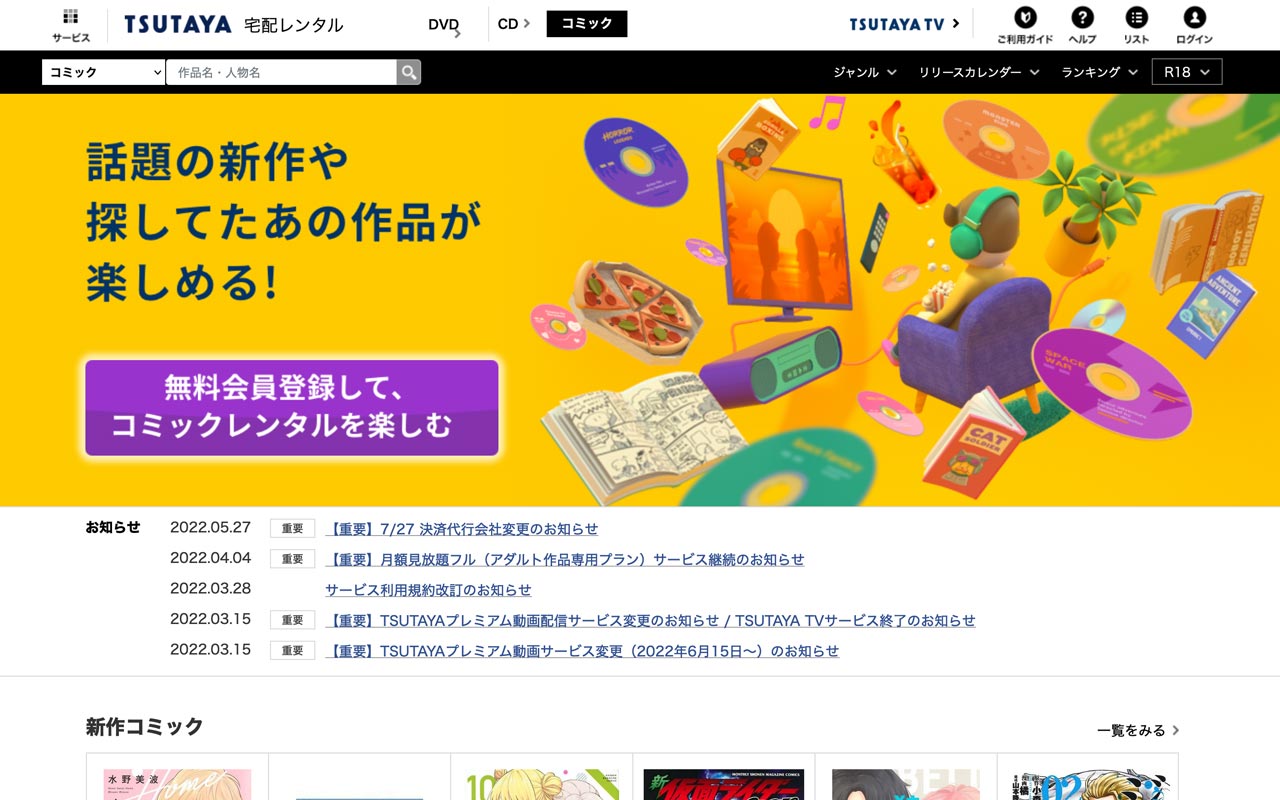
You may have heard of buying used manga, but have you ever considered renting them? How retro! Tsutaya is a huge chain store in Japan that sells/rents out manga, CDs, DVDs, games, and other hobby stuff. It's like a library you pay for…okay, I'm making it sound worse than it is. Think of it as a way to borrow more recent publications than your average library might have in stock.
Renting is great if you'd rather not amass a mountain of books you'll never crack open again.
Renting is a form of secondhand reuse and great if you'd rather not amass a mountain of books you'll never crack open again. But if you're not into the idea of returning what you paid for, you can also buy things normally at Tsutaya. You can also find used books and manga in general by typing 中古ランク (chūko ranku, "used [item] rank") into the search bar. That'll show you secondhand items with their quality "ranking" listed, from S to C.
Here are some words to remember when renting things through Tsutaya (and probably other places too!):
| 貸出中 or 貸し出し中 (kashidashichū) | currently rented out |
| ネットで借りる (netto de kariru) | rent online |
| まとめてレンタル (matomete rentaru) | bulk rental (e.g. all volumes of a manga series) |
| 宅配レンタル (takuhai rentaru) | home delivery rental |
On their online website, books can only be bought, but manga, CDs, and DVDs can be either bought or rented. If the item you want is available for rent, the listing should have a button that says ネットで借りる (netto de kariru, "rent online") on the right of the screen. But if you want to see only rentables, click the tab at the top that says 宅配レンタル (takuhai rentaru, "home delivery rental") and comb through your options. Then you just wait for your item to arrive in your mailbox, enjoy it, and send it back for someone else of similar taste to consume. Just like Ye Olde Netflix.
The rental period is twenty nights and twenty-one days.
The rental period is twenty nights and twenty-one days, and then you'll be charged 55 yen per day as a late fee. Tsutaya rentals have a set price in Japan for both the items themselves and shipping depending on how many volumes you order (up to thirty per box). You can check out the full table on their rental guide. Shipping makes the prices a little steep, in my opinion, but they do seem to come and pick up your items for free when you're done with them. So maybe it's a fair trade?
There are some more downsides to Tsutaya, though. Tsutaya doesn't have as many secondhand options as other bookstores I've mentioned, and many of those listings don't have pictures. Also, there's no international online store, with only a few physical locations in the US. But for a certain type of person who prefers renting over buying, Tsutaya can definitely work out.
Auction Sites
I'm sure you're familiar with auction sites like eBay. But what about the Japanese equivalents?
You often need a Japanese credit card, phone number, address, etc. to bid on things.
eBay actually doesn't currently exist in Japan — instead, the biggest auction site is Yahoo! Japan Auctions, or Yafuoku! (ヤフオク!). They can be difficult to use as a foreigner in Japan, as you often need a Japanese credit card, phone number, address, etc. to bid on things. But as long as you have these things, you can find some pretty good deals, especially if what you want isn't available to buy or add to a bulk order anywhere else. So people looking for limited/collectors' editions and out-of-print or hard-to-find books might have some luck here!
If you're looking for secondhand books and manga, just pop the word 中古 (chūko, "secondhand') into the search bar with the title of what you're looking for. Some retailers like Book-Off and Net Off also sell on these auction sites, along with specific online storefronts like もったいない本舗 (mottainai honpo) that sell a lot of used books.
For shoppers outside of Japan, you can look for items that will ship internationally by searching the term 海外発送可 (kaigai hassō ka, "international shipping available"). What you unearth this way may be pretty random, but you can still find some pretty cool stuff. When we looked, we found a collection of 110 random manga/books and a Japanese version of The Little Prince.
To use these sites from overseas, you'll have to jump through some hoops.
To use these sites from overseas otherwise, though, you'll have to jump through some hoops. One option is to use proxy or forwarding services that bid on/buy items, receive them domestically on your behalf, and then ship them to you internationally. Yahoo! Auctions officially partners with a proxy service called Buyee, or you can use other forwarding services like White Rabbit Express, ZenMarket, DeJapan, etc. This method might be handy if you're really in a bind, but keep in mind that the convenience and commission fees can make it fairly pricey.
Another strategy is to ask a friend, acquaintance, or trusted member of the expat community to do you a solid and act as your proxy. Some expats run services dedicated to this, like No Country for Tall Men Exports in the idol/anime community. If you get deep enough into any Japan-related fandom, you'll likely find some kind Japan-dweller known for shipping stuff at a rate that hopefully beats the bigger proxy services out there. These people will often personally buy, bid on, package, and ship items to you as a one-stop service, so it's worth looking into.
All in all, auction sites aren't the most straightforward way of buying secondhand books/manga. But it's certainly an option, especially if you're looking for something specific and/or live in Japan already.
Manga Zenkan (漫画全巻ドットコム)
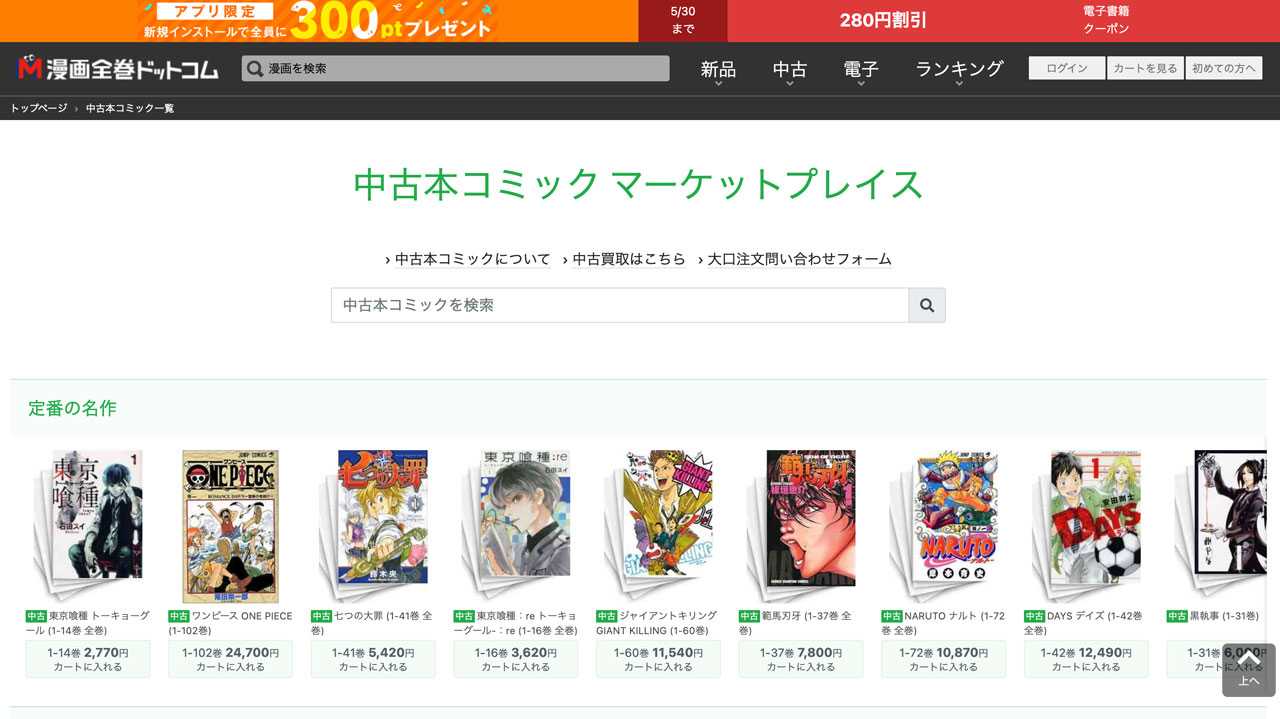
Does the idea of buying just one volume of manga at a time give you the shivers? Would you rather look at some cartoons than read actual literature? Then check out Manga Zenkan, an online store that mostly only sells complete sets of manga series. You can buy single volumes of manga in e-book format, but if you want physical manga, it's all or nothing.
Manga Zenkan is an online store that mostly only sells complete sets of manga series.
Look in the 中古コミック (chūko komikku, "secondhand manga/comics") section, separate from the 新品コミック (shimpin komikku, "new manga/comics") section, to see only secondhand manga. If you're in Japan, shipping will be easy, as the light of Amaterasu shines down upon you. If you're overseas, good luck with that. You can definitely try to use their partner proxy service, Worldshopping, to get your goods shipped, though it might be a little pricey. People in Japan can also engage in some 買い取り ("resale/buyback"), much like at other stores on this list, though it seems they only pay you in points to use on Manga Zenkan. Slick of them!
Ironically enough, buying all the volumes individually elsewhere can sometimes be cheaper than springing for the pre-bundled set on Manga Zenkan. But if you are looking for a set of untranslated manga that you can't find anywhere else, Manga Zenkan could be a convenient choice.
Read 'Em and Weep
Now you know how to shop for secondhand books and manga in Japan or from overseas. Doesn't it feel good to reuse? Can you feel the earth wrapping its arms around you and whispering ありがとうございます5?
Reading any form of Japanese literature can introduce you to new elements of Japanese language and culture, and now you can do it a little more sustainably. So I hope that after reading this article, you feel more comfortable galloping into your nearest local used bookstore, Book-Off, or Mercari homepage and taking a gander at what they've got. And if you'd like to keep reading about how to spend your yen greenly, check out our other articles on secondhand shopping in Japan.
Anyway, now that I've introduced you to all these different bookstores, see you at Shopaholics Anonymous!
